vol 18, July 2001

New Directions Along the Aiki Way

New Directions Along the Aiki Way
Aiki-Extensions Third International Conference
Contributed by Vaughn Brandt*
"If the spirit and patterns of aikido can be characterized by a circle, then how big can the circle of your practice be?" This is a question that, in one form or another, the affiliates of Aiki-Extensions have
all asked themselves.
Can that circle of practice go beyond yourself, beyond uke, off the mat, or even outside of the dojo? O'Sensei certainly hoped that it would, and fortunately he is not alone in that vision.
As the problems of this world become more acute, and the public consciousness of them becomes more aware, many Aikido teachers and practitioners are using their experiences on the mat to extend O'Sensei's teachings and the lessons of Aikido to the world at large.
For many, there is a calling to demonstrate the principles of the Art of Peace outside the dojo. Many have been inspired and empowered by the practice to pioneer new ways of presenting, demonstrating, and instructing Aikido principles to non-aikidokas. For them, the peacemaking potential of Aikido offers a rich opportunity for the public at large. By using somatic exercises and dynamic exchanges, they are turning people on in many different spheres of life to the fundamental principles of Aikido.
At the Third International Conference of Aiki Extensions, titled New Directions Along the Aiki Way, about 55 teachers and practitioners of the art came together to share and present how they are expanding the circles of their practice off the mat to contribute to the actualization of O'Sensei's greater vision of world peace.
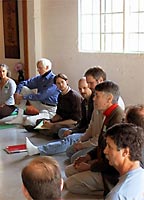
The conference was held at the beautiful and spacious Aikido of Tamalpais Dojo in Mill Valley, CA on March 23rd-25th, 2001. Over the course of those three days it was demonstrated beyond a doubt that the
circles of love and energy that O'Sensei cultivated are coming to fruition and being extended into the world at large.
A stellar group of practitioners kept the program packed with powerful presentations. This year's conference set a new level for the organization with a wealth of experienced Aikido teachers and
"extenders" in attendance. The participants' cumulative years of training and teaching Aikido covered lifetimes. The conference was held on the mat and combined spoken presentations with experiential
learning activities, Aikido training, and genuine play.
Though it is difficult to summarize the depth and power of the presentations, a brief description of some of them is in order to provide a sense for the flavor and content of the event.
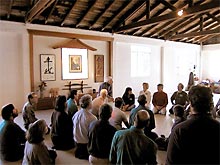 Transformation and Options:
Transformation and Options:
George Leonard started off the program with a mini-workshop summarizing his own work and offering unique insights on his personal evolution as a writer and teacher along the Aiki way. He discussed the guiding principles of presenting and connecting with audiences, the essence of his work on Integral Transformative Practice, his unique perspectives on the power of narrative and context, and his view of the role of the body as a teacher. Leonard Sensei emphasized the relationships between being generous and being genious, giving everything and holding nothing back. He spoke of operating from a place of radical freedom to maximize the number of perceived and actual options. "As anything moves towards breakdown, there are less perceived options," he said. Leonard Sensei has asked over 50,000 people in audiences from many different cultures, "What do you do when someone pushes you?" The resounding answer that he gets is, "Push back." By demonstrating the power of tenkan, entering and blending with a push, Aikido teaches us that there are other options, and this is something Leonard is helping to teach the world. Using this and other Aikido principles, he demonstrates to audiences and readers around the world that there are other options available to expand the circles of peace. For more of his work, see: http://www.ITP-life.com.
Violence Prevention with Young People:
Victor LaCerva, a former Emergency Room physician, now leads conferences on violence prevention for young people. His presentations involve experiential learning mixed with a spoken presentation of some very startling facts about violence. Some of the topics he covers include the causes of violence, avoiding victimization, suicide, firearms safety, and what to do when threatened. After the spoken presentation, he involved the conference participants in some of the interactive exercises that he uses in his workshops. The Aikido principles of purification, awareness, blending, trusting, and compassion were beautifully illustrated and were able to be directly experienced in the exercises he uses.
Building a High School on Aiki Principles:
Tom Osborn also focuses his extension work by working with kids. He and a few others are in the process of combining the power of kinesthetics with the power of an intentional community to form a high school. Osborn has many years of experience working in and with schools, and is now expanding his vision to create a high school based on aiki principles, called Crystal Farm School, near Holyoke, MA. This project is still in the formative and fund-raising stages, but it is very promising. If you would like to learn more, or offer your support to the project, please contact Tom via email at tdosborn@mediaone.net.
Conscious Embodiment:
Wendy Palmer offered a mini-workshop on her work, which she calls Conscious Embodiment. She works with individuals and groups, often bringing out her bokken to get people's attention. She described and demonstrated some of the exercises that she uses to demonstrate Aiki principles. The power of personal responsibility, having the center to overcome, and maintaining a dynamic sense of development were some of the topics she covered. She presented her work with humor, candor, and grace, emphasizing the power of remembering the divine connections, sharing first to act as an exemplar, and the healing power of humor to add ventilation to self-processes. For more info on Palmer Sensei's work, please see: http://www.consciousembodiment.com.
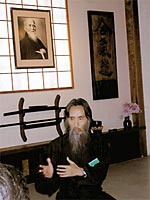 The Art of Breakthrough:
The Art of Breakthrough:
Kaz Tanahashi, a former student of O'Sensei in Iwama in the post-war era, discussed with participants the art and nature of breakthrough, and the need for more of it in today's world. Tanahashi Sensei is a renowned translator, publisher, writer, and calligrapher. As an artist, Tanahashi describes his trade as a license to be crazy, but the work he is doing actually transcends the mainstream insanity of our time. His work focuses on the nature of breakthrough as an enlightenment experience, emphasizing the need for a breakthrough in social consciousness, particularly with regard to the global environmental awareness. He believes that now more than ever, human beings need a breakthrough to change the direction of the global consciousness towards a more ecological understanding to regain stability and sustainability on the Earth. Though he no longer practices on the mat, he discussed the power of aikido, as a practice and as metaphor, for creating positive changes in the world. Some of the benefits that he sees to extending aiki principles include the dissolution of categories, a discovery of new options, as a way to teach the body with physical metaphors, and as a way for human beings to develop an awareness of the relationship to others in a compassionate way. For more info on his work, please see: http://www.brushmind.com.
Playing with Aikido:
Fred Donaldson, who could be described as a play specialist, mixed up the flow with an enthralling presentation on the nature of play and his work with children and animals. Fred has worked with a variety of wild animals and kids to develop a stunning understanding of the power of play. His presentation was a highlight for many participants not only because of his genuine sincerity and spirited tone, but also because of the youthful freedom and frolicking innocence of his guided exercise on play. After telling some rather amazing stories of his own breakthroughs connecting with children who have special needs and dangerous wild animals, the participants were encouraged to simply play from the heart. Fred led us back to the original sense of intentionless play and had the participants crawling and rolling around together on mat, laughing and releasing all of the usual intentions and expectations of adult life. Though the culmination of his presentation may have appeared rather silly to an outside observer, the healing power of play was clearly elucidated and experienced first hand by the participants. For more info on this, please see: http://www.originalplay.com.
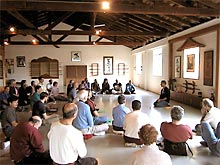 The Marine Warrior Project:
The Marine Warrior Project:
Richard Heckler presented the work he is doing to develop training programs for the U.S. Military that emphasize character values, ethical and moral decision making, and provide the modern soldier with nonviolent intervention options on peacekeeping missions. Heckler Sensei has worked with the U.S. Special Forces and the Marine Corp. for the last fifteen years, and his work has culminated with the construction of an aikido dojo on every Marine base in the world and has involved over 275,000 soldiers, with the ongoing promise of effecting another 40,000 recruits every year. This monumental accomplishment to provide aikido training to the military is an ongoing activity and has received a lot of support from the Pentagon. Heckler Sensei also conducts relationship and leadership training for organizations and individuals at the Rancho Strozzi Institute. In his presentation he emphasized the importance of the body as an integral part of the self, and how to change and improve the body to improve the self. "There is a longing to have a different kind of self," he said, and his work is effecting the lives of thousands of people who are interested in taking that step. For more information on his civilian training programs, see: http://www.ranchostrozzi.com.
The Training of National and International Leaders and Mediators:
Richard Moon and Chris Thorsen offered a presentation on the work they have done to develop themselves as advisors to leaders to create large organizational change efforts in domestic businesses and in international peacekeeping efforts. They have worked in corporations to "train the trainers," by providing new models of communication and organization. They have also worked to train international
peacekeeping mediators during the crisis in Bosnia. "Listening implies a change in who we are and what we are.... Listening, with an open heart, generates incredible power." Moon Sensei said. "Everytime somebody goes off (violently or emotionally), it is because somebody doesn't feel seen and heard." By teaching mediators and organizational leaders how to operate with the power of openness and listening, the presenters are helping to restructure systems to operate more harmoniously and experience less conflict both internally and externally. For more information on their work see, http://www.listeninginstitute.com, and http://www.quantumedge.org.
Other presentation topics included the uses of Aiki principles in psychotherapy, mediation, bodywork, academic research, university education, and music. During the conference, the Aiki-Extensions
Clusters also met for networking and smaller group processing of specialized topics.
Another highlight was the conference dinner on Saturday, which was followed up by a presentation by Stan Pranin on "The Spiritual Odyssey of Morihei Ueshiba." During this highly charged presentation and
dialogue, the life and history of the founder and the art were discussed in detail, with many little known facts coming to light.
Overall, the conference proved to be an incredible experience that was motivating and empowering for all. For many people who are doing extension work, there is sometimes a feeling of alienation because the Aiki principles are not yet commonly known or accepted by mainstream cultures. But by coming together to regroup and share, a powerful sense of clarity and purpose was generated to continue
expanding the circles of peacemaking into the world.
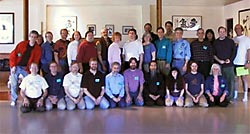 As the conference came to a close, the participants shared their experiences and held a final business meeting to discuss the future directions of Aiki-Extensions. It was resoundingly clear that the organization is providing a valuable service to its members and that its growth and development will continue in the years to come. As Aiki-Extensions continues to grow and evolve, please feel free to get involved either as an observer or an affiliate. All are welcome to access our communications through the web site, to subscribe to our listserve, and to participate in our conferences. For more information on how to do so, please see http://www.aiki-extensions.org.
As the conference came to a close, the participants shared their experiences and held a final business meeting to discuss the future directions of Aiki-Extensions. It was resoundingly clear that the organization is providing a valuable service to its members and that its growth and development will continue in the years to come. As Aiki-Extensions continues to grow and evolve, please feel free to get involved either as an observer or an affiliate. All are welcome to access our communications through the web site, to subscribe to our listserve, and to participate in our conferences. For more information on how to do so, please see http://www.aiki-extensions.org.
* Vaughn Brandt is a student of Aikido of Madison, in Madison Wisconsin, where he trains under John Stone and Robin Cooper. He works in the Wisconsin inpatient mental health institutes and secure treatment facilities in the field of patient rights. In his professional role, he emphasizes problem-solving negotiations and harmonious approaches to dispute resolution and staff training. Vaughn has studied psychology, East Asian studies, and constitutional law at the University of Wisconsin - Madison.
Pictures reproduced with kind permission of Jun Akiyama.



